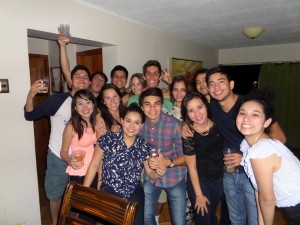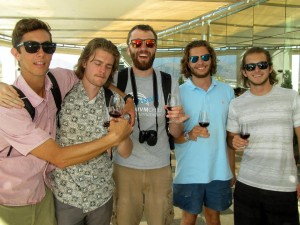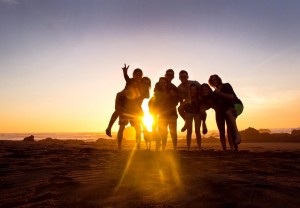Originally when I imagined
studying abroad in Chile, I had a certain image of what my life would be like. I noticed that CEA CAPA only had five other students going to Vina del Mar with me and assumed that was the extent of the international students that would be studying at UVM. This was fine with me though, because I planned on being gone most of the weekends on solo camping trips to the south to surf and explore. I hoped to make friends with some of the local students, but was more concerned with simply traveling and learning Spanish.
 |
| International Hospitality |
When I arrived I met other international students and figured maybe there were nine or ten of us total. I met the five other students who were also being picked up from the airport and eventually learned that there are about one hundred other international students at UVM. After meeting these hundred students I realized that there is a certain type of person that chooses Chile as a study abroad destination. It’s not known as a tropical vacation destination, or as having the best food or coffee, or speaking English, basically it’s not Europe or
Australia. It’s rare to find English speakers here, the food is good if you search for it, and the coffee honestly is pretty awful. But what it lacks in the comforts of home (whether that’s the U.S. Germany, Canada, etc.) it makes up for in adventure, raw nature, miles and miles of coastline, and the opportunity to learn a new language by necessity. I would argue that this is why Chile attracts a different, more adventurous, type of student. In my first week here I met a German who worked as an Au Pair, an American who camped in Alaska for three weeks, two girls who volunteered in Kenya, and twenty other students with similar histories. I would encourage Chile as a study abroad location simply based on the people that it attracts.
 |
| Ruta De Vino with adventurous folk |
The study abroad experience also places all of these people in the same situation so that there is no shortage of topics for conversation, from dealing with the new food, new language, public transportation, host families, Chilean people, or people’s backgrounds. Finding this tightly knit group of international students within the first week completely changed my image of what my experience was going to be. It became a much more social experience than I had expected, and now as I near my second month living in Chile with students from Germany, the U.S., Mexico,
France, I’m grateful that I was wrong.
 |
| New things aren't as scary when you share them |
I’ve had some of the best experiences shared with these people. We’ve gotten lost on buses, stayed up until six and recently backpacked through Patagonia. But the epiphany for me was when I told some of my friends the third or fourth week that I was going to take a bus down south to camp on the beach and surf for the weekend. The next day I had seven friends travelling six hours with me, just to camp and hang out on the beach while I surfed, without being invited. That evening when I finished surfing and walked back up the beach to where everybody was camped out and playing paddleball, I realized that this reality was exponentially better than I had planned.
 |
| Stoked to have these people traveling with me |











